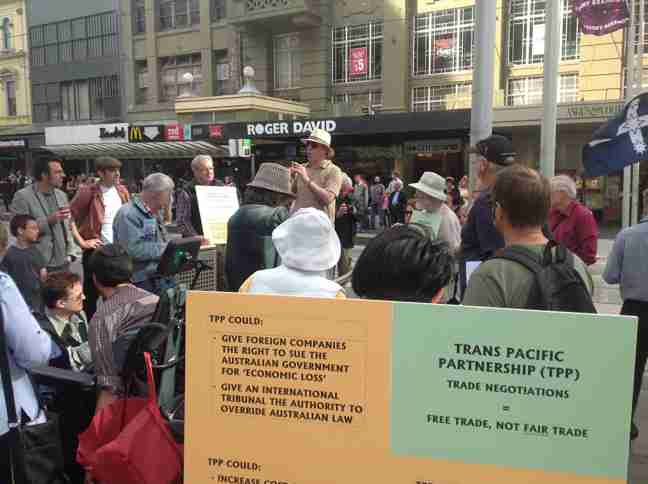

Shirley Winton and Ted Murphy speaking at Community and Union Rally in Melbourne, May 11.
Below is a talk given by Shirley Winton, organiser with the Communication Workers Union – Postal Division (Vic), at the VictorianTrades Hall Council information evening on the implications of the Trans Pacific Partnership Agreement. 3 May 2013.
I’m going to talk mainly about the Trans Pacific Partnership free trade agreement requirements for State Owned Enterprises, Public Services and Corporate Investor Rights and what it means for the last few remaining publicly owned, but corporatized entities, like Australia Post, Medibank, the NBN and even the recently announced decision by the Qld. premier not to privatise Queensland electricity. All three clauses in the TPP are connected and should be viewed together. Other speakers will talk about labour laws, PBS (health), and the erosion of democratic rights.
The TPP is the continuation and extension of neo-liberal policies set in motion in mid 1980s around the world (including Australia), mainly by US multinationals, the US government and other global corporations. Unrestricted access to markets, unrestricted flow of goods, services and capital investment mainly for US multinational corporations is central to this neo-liberal agenda to give global corporations more freedom to exploit natural resources, source cheaper and cheapest labour across the world, remove all restrictions on local markets and free movement of capital or investments around the world. The TPP aims to push down workers’ wages and conditions around the world even more. It is a grab for more power and profit by global corporations and more burden and hardship for many people in the world. The TPP is a new type of regional agreement that threatens health and well being of people of the world.
Leaked documents show that USA is pushing hard to impose the TPP on countries and remove constraints in domestic policies by national and local governments to maximise their interests at the expense of people’s rights and interests. The TPP would create a mega treaty that will override national and local government laws and standards. Everything could be up for grab by global corporations.
The TPP is an extension of the US-Australia Free Trade Agreement of 2004. It could have far reaching effects on jobs and working conditions, health and safety, the cost of health and education, the cost of medicines, the environment, local agricultural, value added processing and manufacturing industries, quarantine regulations and our independence as a sovereign country in deciding what’s in the interest of people and the environment in Australia.
The TPP will impose regulations on countries’ governments by requiring them to comply with TPP regulations in present and future laws and policies on labour rights and conditions, environment, local procurement, health, and even local government planning and zoning regulations. It puts more restrictions and pressure on sovereign governments favouring local businesses and public services ahead of multinational businesses – even without the TPP this is already happening in Australia. The TPP could make it legally binding for governments not to give preference to local manufacturing and sourcing of local materials.
Even US economist and former World Bank President Joseph Stiglitz said “Most of these free trade agreements are managed for the advantage of US, which has the bulk of the negotiating power.”
To understand what’s possibly in store for Australia Post under the TPP we should see it in the context of requirements in the Investor Rights, State Owned Enterprises and Public Services.
Corporate Investor Rights and the Investor State Disputes Settlement Clause
The US wants special rights for foreign investors and corporations to sue governments if local laws and regulations restrict or impede their investments in maximising profits in a sovereign country. This would overrule local domestic laws. The TPP will establish international tribunal, Investor State Disputes Settlement, governed by the World Bank where disputes between foreign corporations and national governments are decided on. They will override local courts of the country investors operate in.
A report by the United Nations Conference on Trade and Development noted that under existing Free Trade Agreements like NAFTA in 2012, 62 investor state cases had been lodged in the international tribunal. In past 15 years there have been 518 cases of foreign corporations and investors suing national and local governments. In 68% of these cases it was a developing country whose health, environment or other public policy or standards were being directly challenged by foreign corporations. The report also stated that the corporations that have launched investor-state cases to date are predominantly US corporations.
These cases are decided by tribunals that sit outside of any domestic legal system, comprising 3 private sector lawyers and rotating between acting as “judges” one day and advocating for corporations suing governments the next. The UN report further notes that of cases decided in 2012, 70% of the victories went to foreign investors, resulting in governments being ordered to compensate the corporations.
The mining tax, carbon tax, or any other government laws and regulations could be challenged.
The threat of being sued by global multinational corporations who are worth billions or trillions of dollars would be an incentive in itself for governments not to enforce their own local standards and regulations – eg in Australia health and safety standards, workers’ rights, working conditions for 457 Visa workers and other workers from overseas, environmental laws and standards, local content.
The multi-million US owned Occidental Petroleum Corporation operating in Ecuador took the Ecuadorian government to the tribunal claiming damages. The tribunal ordered the Ecuadorian government to pay $1.8billion in compensation that rose to $2.4 billion with interest and fees which is roughly the Ecuadorian government’s annual expenditure on health care for half the country. The Ecuadorian government is continuing to refuse to pay.
Dow Chemicals and other corporations have stated that “US companies just can’t compete in foreign markets when those governments give an unfair advantage to their own infrastructure and labour pool, rather than favouring US imports and foreign investment”. And we should add cheaper imported labour.
- The special privileges provide foreign investors new rights to own and control other countries natural resources and land.
- The tribunals are empowered to impose trade sanctions until laws are changed.
Credit is due to Australian government for continuing to refuse to sign the Investor Rights Clause and removal of PBS, until now. But if the US (who are pushing this) don’t get their way with this clause, it is possible that aspects of the proposed powers are likely to be incorporated in the words of the agreement or through different clauses of the agreement. The Australian public must pressure the government not to cave in to US threats and intimidation.
State-Owned Enterprises – or corporatized public services and instrumentalities (Australia Post and Medibank Private).
The experience of corporatised public services and instrumentalities has been that of preparing and breaking up public services for privatisation. i.e. get rid of all the low profit or non-profit making areas of public and community services and make them attractive for sale to corporations.
Even some of these corporatised public entities have some government protection. For example Australia Post has a Community Obligation Charter that requires it to provide mail and retail services to remote communities, even though they may not be profitable or profitable enough. The TPP would require Post to remove these community obligation requirements.
The TPP would remove any remaining vestiges of government protection and financial support for public services to the community. Corporations want what they call free markets and free competition where local state owned enterprises and public services do not get preferential treatment or protection (eg subsidies).
A good example of this is the Japan Post which is owned and strongly protected by the Japanese government. US corporations want to remove that government protection and have said they will exclude Japan from joining the TPP until the Japanese government removes its protection for the public postal services and opens it up to competition from foreign corporations and investors. Just recently Japanese government had agreed to open up its insurance service provided by Japan Post to competitors and competition.
However, the US government and corporations want to exempt themselves from these TPP SOE requirements imposed on other countries that would remove government regulations and support of SOEs or government assistance to local businesses. For example, under the TPP the US government assistance to General Motors of tens of millions of government funds to bail it out of financial crisis, and the protection of fully publicly owned US Bank of North Dakota from competitors would be illegal.
The US wants to use the TPP to remove any regulation and conditions that presently or in future require sovereign governments or local businesses to procure goods and services from local manufacturers and providers and so protect local jobs and industries. However, again the US seeks exemption from these regulations for the US companies and government.
The US wants the TPP to impose on sovereign governments legislation that actually promotes and favours market access for foreign investors and corporations.
The TPP is likely to strip state enterprises of their traditional “public good” functions.
Experiences with SOEs in Australia and New Zealand show that corporatisation of state instrumentalities is a first step on a pathway to eventual privatisation and selling off of public services and instrumentalities. The few remaining corporatised SOEs in Australia (very few remaining now) and New Zealand have resulted in fewer, less accessible and inferior social and community services, and in some cases got rid of these even weak community obligations altogether.
The TPP could ensure privatised services and instrumentalities could not be brought back in future into public hands.
The US puts Australia’s SOE’s into a “competitive neutrality” category, meaning our government policies and restrictions on competition from foreign corporations and investors are minimal and there are very few obstructions to their corporations and investments in Australia. However, there are still some remnants of public services that remain and need to be defended.
Public Services
The US corporations pushing the TPP want to open up as many services as possible to international investment and reduce the rights of governments to regulate those services. This will pave the way for privatisation. It threatens the rights of sovereign governments to provide affordable and quality health and public services, education, energy, water, public transport and postal services.
Australia Post
Australia Post has been operating for more than 200 years and is a national icon in providing a public and community service. Until recently, it has provided a public service that has, in the main, been accessible and affordable to the community. In many communities, especially in rural and remote areas, the Post Office has been the hub for local communities. Many of its operations, particularly in providing an important service to rural and remote communities did not make huge profits, sometimes none, but the government, through the people’s taxes and supported by the public, carried the cost in providing a service. However, services have been cut back, the less profitable post offices are being sold off or closed down altogether and publicly owned buildings have been sold off.
There’ve been cut backs in the number of workers (not just through technological changes), work loads are increasing and postal workers’ wages, some of the lowest in the country, have fallen behind the cost of living.
Australia Post is what is referred to under the TPP as a state owned enterprise – it’s operating on a commercial basis but still owned by the Australian government. It generates a healthy dividend for the government, last financial year it was $213 million, on top of the $281 million clear profit, an increase of 16.6% on previous year.
The Commonwealth government regulates the price of mail postage – i.e. presently 60c stamp on a standard letter anywhere in Australia. It also has a community service obligation charter that requires it to operate in the public and community interest. The Australia government’s SOE Act of 1992 states that the principal objective of each state business corporation is to perform its functions for the public benefit. Under the TPP these public interest requirements in the Community Obligation Charter and the regulation of uniform and affordable cost of mail postage could be removed.
Finally, what has recently occurred in some of Australia Post’s retail shops is an indication where the TPP will take public services. American Express has been allowed to set up its own counter services (with its own staff) inside some of the Retail Post Offices and offer international currency transactions, in competition with Australia Post’s identical service. Very little is known about the secret agreement between Australia Post and American Express, one of the biggest multinational corporations. Australia Post does not charge customers commission on the currency exchange transactions service, nor will American Express. Obviously, this will reduce work for Australia Post employees and the union believes lead to more job losses.
For American Express currency exchange is only a tiny part of its operations. Amongst other things it offers is travel insurance, as does Australia Post presently. When asked by the union about the threat of AMEX to Australia Post services and jobs, the CEO of Australia Post claimed that an agreement had been made with AMEX not to compete with other services offered in the Post shops and it will only offer currency exchange services. You have to ask why a giant multinational enters into such secret arrangements that could generate tiny, (if any) profits, unless there is a long term gain, a step in the door and an opportunity for bigger stakes in the future. Even if the CEO’s claims are true, under the TPP requirements the present protection of Australia Post’s services from competitors in its own retail shops would be removed in the name of competition and free market. And we know which competitor will win in an uneven level playing field.
The Australian government is not objecting to TPP requirements for SOEs, but there is a lot of horse trading going on presently and what sort of deals and trade offs are being made on behalf of Australian people is anyone’s guess.
The TPP- Free Trade has been referred to as corporate globalisation, imperialist globalisation and economic imperialism. It is all of these.
There is a real basis of unity by broad sections of the Australian public on the TPP. The campaign has the potential to unite a very wide cross section of the public – unions, small farmers, local manufacturers, health workers, educators, environmentalists and many more. It is the unity in which the union movement can play a very critical role.




